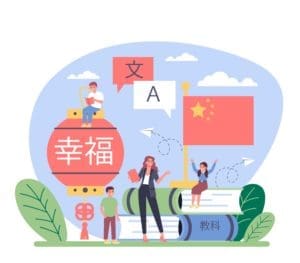Translating documents in a legal environment is not simply the word-for-word exchange from one language to the next. Not only are translators faced with challenges when there is no direct translation of a term from the original language to the target language, but also translating in a legal context requires an understanding of the technical language of both countries and cultures. Legal terminology is a product of the national legal system of each country and its terms represent the shared understanding of broad concepts relevant to their citizens.
For entities conducting business, completing real estate transactions, or performing other legal services with parties in China, there are additional challenges making accurate legal translation even more difficult.
China’s Leap into the International Market Creates Challenges
According to a study published by McKinsey Global Institute1 in 2019, China is making strides to increase their international business relations, although a history of self-reliance has placed them further behind on this track than other countries.
“China has made progress in integrating with the world economy, achieving true global scale as a trading nation, but not in other areas such as finance. Now the relationship between China and the rest of the world is changing. A great deal of value could be at stake depending on whether there is more or less engagement.”
For example, 110 of the Global Fortune 500 companies are located in China, but 80% of their revenue continues to be earned domestically. This illustrates two opposing forces at work within China: one part desires to extend international relations and is making great strides while the other part remains confident holding onto a system of domestic self-reliance.
Why is this relevant to legal translations?
 The historic nature of the Chinese government kept their country closed off to much of the world until the 1970s. During the Cultural Revolution following the death of the communist leader, Mao Zedong, China began to embrace opening itself up to the rest of the world and as a result, found it needed to reform the ways it conducted business internationally. A significant amount of that work included reforming, or in many instances, creating laws needed for successful international partnerships. “Even though China has no rule of law tradition, it has been making rapid progress since the policy of reform and opening-up was adopted in 1978 in setting up a legal system that is supportive of a market economy.”2 Currently, there is a notable gap between Western legal traditions built on English common law and the concepts and practices of law in China.
The historic nature of the Chinese government kept their country closed off to much of the world until the 1970s. During the Cultural Revolution following the death of the communist leader, Mao Zedong, China began to embrace opening itself up to the rest of the world and as a result, found it needed to reform the ways it conducted business internationally. A significant amount of that work included reforming, or in many instances, creating laws needed for successful international partnerships. “Even though China has no rule of law tradition, it has been making rapid progress since the policy of reform and opening-up was adopted in 1978 in setting up a legal system that is supportive of a market economy.”2 Currently, there is a notable gap between Western legal traditions built on English common law and the concepts and practices of law in China.
Deborah Cao describes this challenge in an article written for Translators’ Journal3:
“The Chinese legal system evolved differently from the major legal systems in the West. Chinese society, from ancient times, has predominantly been a society based on ‘rule by the elite’ rather than ‘rule of law.’…In the past four decades or so, the People’s Republic of China’s legal system has also been evolving around political ideology and it has developed what China terms the socialist legal system. This stands in contrast to the legal traditions in the West such as the English common law system.”
Cao goes on to illustrate this challenge with the common legal term of “equity” including “equitable rights” and “equitable interest.” While the terms can literally be translated into the Chinese language as “hengping quanli” and “hengping liyi,” they have no meaning to the Chinese parties of the contract because equity is not a concept used within the Chinese legal system that has developed to date. A translator without that legal knowledge could easily include terms in a contract that have no meaning for the Chinese party involved.
How do you achieve an accurate translation for legal documents from China?
Hopefully this paper illustrates the importance of sourcing a translator who is not only fluent in the Chinese language, but is also knowledgeable about the current state of the law in China-specific to the type of situation relevant to the document. At The Perfect Translation, our translators have the legal experience and knowledge in combination with language fluency to provide you the most accurate legal translation of your important documents. Simply contact us today for a free quote.
Woetzel, Jonathan, et. al: China and the world: Inside the dynamics of a changing relationship, McKinsey Global Institute, July 2019. ↩
Liu Junhai: Legal Reforms in China, ZEF – Discussion Papers on Development Policy No. 13, Center for Development Research, Bonn, August 1999, pp. 90. ↩
Cao, Deborah: Consideration in Translating English/Chinese Contract, Translators’ Journal, Volume 42, Number 4, December 1997. ↩

Leave a Reply